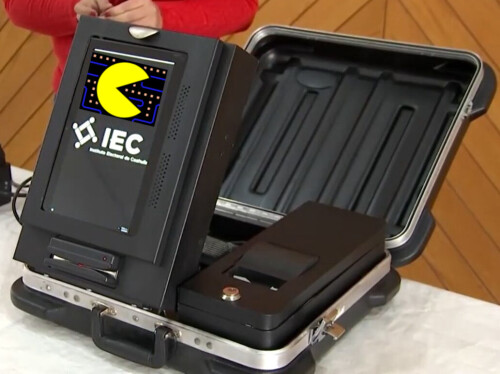Cheatable e-voting booths in Coahuila, Mexico, detected at the last minute
It’s been a very long time I haven’t blogged about e-voting, although some might remember it’s been a topic I have long worked with; particularly, it was the topic of my 2018 Masters thesis, plus some five articles I wrote in the 2010-2018 period. After the thesis, I have to admit I got weary of the subject, and haven’t pursued it anymore.
So, I was saddened and dismayed to read that –once again, as it has already happened– the electoral authorities would set up a pilot e-voting program in the local elections this year, that would probably lead to a wider deployment next year, in the Federal elections.
This year (…this week!), two States will have elections for their Governors and local Legislative branches: Coahuila (North, bordering with Texas) and Mexico (Center, surrounding Mexico City). They are very different states, demographically and in their development level.
Pilot programs with e-voting booths have been seen in four states TTBOMK in the last ~15 years: Jalisco (West), Mexico City, State of Mexico and Coahuila. In Coahuila, several universities have teamed up with the Electoral Institute to develop their e-voting booth; a good thing that I can say about how this has been done in my country is that, at least, the Electoral Institute is providing their own implementations, instead of sourcing with e-booth vendors (which have their long, tragic story mostly in the USA, but also in other places). Not only that: They are subjecting the machines to audit processes. Not open audit processes, as demanded by academics in the field, but nevertheless, external, rigorous audit processes.
But still, what me and other colleagues with Computer Security background oppose to is not a specific e-voting implementation, but the adoption of e-voting in general. If for nothing else, because of the extra complexity it brings, because of the many more checks that have to be put in place, and… Because as programmers, we are aware of the ease with which bugs can creep in any given implementation… both honest bugs (mistakes) and, much worse, bugs that are secretly requested and paid for.
Anyway, leave this bit aside for a while. I’m not implying there was any ill intent in the design or implementation of these e-voting booths.
Two days ago, the Electoral Institute announced there was an important bug found in the Coahuila implementation. The bug consists, as far as I can understand from the information reported in newspapers, in:
- Each voter approaches their electoral authorities, who verify their identity and their authorization to vote in that precinct
- The voter is given an activation code, with which they go to the voting booth
- The booth is activated and enables each voter to cast a vote only once
The problem was that the activation codes remained active after voting, so a voter could vote multiple times.
This seems like an easy problem to be patched — It most likely is. However, given the inability to patch, properly test, and deploy in a timely manner the fix to all of the booths (even though only 74 e-voting booths were to be deployed for this pilot), the whole pilot for Coahuila was scratched; Mexico State is voting with a different implementation that is not affected by this issue.
This illustrates very well one of the main issues with e-voting technology: It requires a team of domain-specific experts to perform a highly specialized task (code and physical audits). I am happy and proud to say that part of the auditing experts were the professors of the Information Security Masters program of ESIME Culhuacán (the Masters program I was part of).
The reaction by the Electoral Institute was correct. As far as I understand, there is no evidence suggesting this bug could have been purposefully built, but it’s not impossible to rule it out.
A traditional, paper-and-ink-based process is not only immune to attacks (or mistakes!) based on code such as this one, but can be audited by anybody. And that is, I believe, a fundamental property of democracy: ensuring the process is done right is not limited to a handful of domain experts. Not only that: In Mexico, I am sure there are hundreds of very proficient developers that could perform a code and equipment audit such as this one, but the audits are open by invitation only, so being an expert is not enough to get clearance to do this.
In a democracy, the whole process should be observable and verifiable by anybody interested in doing so.
Some links about this news:
- INE cancela urnas electrónicas en Coahuila por error en programación que permitía repetir votos (Milenio)
- Ante fallas, INE cancela uso de urnas electrónicas en Coahuila (Eje Central)
- INE cancela urnas electrónicas de Coahuila (La Capital)
- Urnas electrónicas no se instalarán en Coahuila y será de manera tradicional (El Tiempo)
- Cancela INE voto de urnas electrónicas en Coahuila (Zócalo)
- Cancelan urnas electrónicas en Coahuila porque duplican votos (Alto Nivel)
